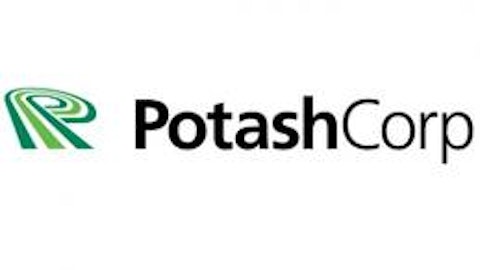Potash Corp./Saskatchewan (USA) (NYSE:POT) shares rose 4.87% yesterday to a closing price of $31.90 per share after it was revealed by German miner K+S AG that the Canadian firm has made an acquisition offer. Considered the first bold decision by Potash Corp.’s CEO Jochen Tilk, who has only been on the job for a year, the bid is also said to have the potential of going hostile, depending on conditions. K+S AG, the biggest supplier of potash in Europe, said that it is “assessing the available options” regarding the bid of the Saskatoon-based company which it happens to be building a potash mine in Saskatchewan for. Potash is a term used for mined or manufactured fertilizer forms of potassium. According to Reuters, Potash Corp./Saskatchewan (USA) (NYSE:POT)’s proposed acquisition may be worth close to 8 billion euros or US$8.9 billion. However, Reuters’ sources also told the news organization that K+S AG, whose own shares jumped by almost 40% today on the Deutsche Börse Xetra, is likely to reject the Canadian fertilizer firm’s proposal as being too low, despite some analysts wondering if the opposite is actually the case.

If Potash Corp./Saskatchewan (USA) (NYSE:POT)’s proposal for K+S AG is successful, the German potash miner will be the first German blue-chip firm to be acquired by a foreign company in a decade, Reuters notes. If the deal fails, it would mark the second large international acquisition failure for Potash Corp. since 2013, when it tried to buy Israel Chemicals Ltd. The acquisition of K+S AG would give Potash Corp. a sizable first presence in Europe. K+S AG believes that Potash Corp. wants to acquire the firm to utilize its capacity and increase its profits, as Potash Corp. is operating under its full capacity due to low potash prices, further complicated by an oversupplied North American market.
These difficulties may be why Potash Corp./Saskatchewan (USA) (NYSE:POT) has experienced a decrease in interest among the hedge funds tracked by Insider Monkey. At the end of the first quarter, a total of 32 of the hedge funds tracked by Insider Monkey were long in this stock, a 3% decline from the fourth quarter. Total value of holdings decreased to $994.74 million in the first quarter from $1.17 billion in the fourth quarter of 2014. This is a notable slide of 15.05%, considering the stock only declined a marginal 8.69% in the first quarter.
In 2014, equity hedge funds returned just 1.4%. In 2013, that figure was 11.3%, and in 2012, they returned just 4.8%. These are embarrassingly low figures compared to the S&P 500 ETF (SPY)’s 13.5% gain in 2014, 32.3% gain in 2013, and 16% gain in 2012. Does this mean that hedge fund managers are dumber than a bucket of rocks when it comes to picking stocks? The answer is definitely no. Our small-cap hedge fund strategy – which identifies the best small-cap stock picks of the best hedge fund managers – returned 28.2% in 2014, 53.2% in 2013, and 33.3% in 2012, outperforming the market each year (it’s outperforming it so far in 2015 too). What’s the reason for this discrepancy, you may ask? The reason is simple: size. Hedge funds have gotten so large, they have to allocate the majority of their money into large-cap liquid stocks that are more efficiently priced. They are like mutual funds now. Consider Ray Dalio’s Bridgewater Associates, the largest in the industry with about $165 billion in AUM. It can’t allocate too much money into a small-cap stock as merely obtaining 2% exposure would really move the price. In fact, Dalio can’t even obtain 2% exposure to many small-cap stocks, even if he essentially owned the entire company, as they’re simply too small (or rather, his fund is too big). This is where we come in. Our research has shown that it is actually hedge funds’ small-cap picks that are their best performing ones and we have consistently identified the best picks of the best managers, returning 142% since the launch of our small-cap strategy compared to less than 60% for the S&P 500 (see the details).
Insider Monkey also tracks insider sentiment in stocks like Potash Corp./Saskatchewan (USA) (NYSE:POT) to resolve whether insiders of a company are betting on their firm’s stock or not. For Potash Corp., however, there were no tracked insider sales or purchases of shares in the first and second quarters of the year.
Taking this into account, let’s review the latest action encompassing Potash Corp./Saskatchewan (USA) (NYSE:POT).



